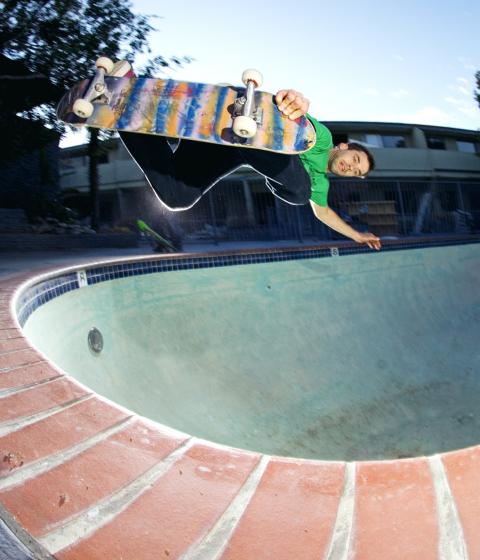Urban Nomad Film Fest (城市游牧影展) continues its partnership with Spring Scream (春吶音樂祭) with the underground film festival screening movies at a side stage for the third year.
In a prelude to the 10th edition of the main Urban Nomad at the end of this month, Urban Nomad at Spring Scream will serve as a laid-back video party at the campground in Oluanpi Lighthouse National Park.
According to its cofounder David Frazier (formerly a reporter at the Taipei Times), the festival will focus on animation and music videos.

Photo Courtesy of Urban Nomad
“The audiences will be overloaded with too much music,” Frazier said. “We want to provide something simple they can watch.”
Frazier intends to mix the short films from the Urban Nomad repertoire with music videos by bands playing at Spring Scream. He has 700 gigabytes of short films to choose from and intends to improvise partially. Three titles have already been short listed.
Abaddon is a 52-minute visual album produced by The Corrupted (Paul Kemp and Gareth Murfin). The film, which features non-stop mind-blowing animated images, was screened last year at Urban Nomad and caught the attention of Taiwan indie band Loh Tsui Kweh Commune (LTK, 濁水溪公社). The band’s lead singer Hsiao-ko (小柯) later commissioned The Corrupted to direct the music video for LTK’s 2010 single Take That, My Love (情人看刀).
Deathbowl to Downtown, directed by American documentary makers Coan Nichols and Rick Charnoski, chronicles the development of skateboarding through “street skating” in the 1990s.
Blood Shed is a horror short based on an article from the skateboard magazine Thrasher. The story follows a group of kids who skate at a house inhabited by a satanic cult, and then gleefully crashes into B movie delirium.
“There will be no plot and no emotional involvement,” Frazier promised. “It’s just a place for people to relax.”

Oct. 21 to Oct. 27 Sanbanqiao Cemetery (三板橋) was once reserved for prominent Japanese residents of Taipei, including former governor-general Motojiro Akashi, who died in Japan in 1919 but requested to be buried in Taiwan. Akashi may have reconsidered his decision if he had known that by the 1980s, his grave had been overrun by the city’s largest illegal settlement, which contained more than 1,000 households and a bustling market with around 170 stalls. Fans of Taiwan New Cinema would recognize the slum, as it was featured in several of director Wan Jen’s (萬仁) films about Taipei’s disadvantaged, including The Sandwich

“Wish You Luck is not just a culinary experience, it’s a continuation of our cultural tradition,” says James Vuong (王豪豐), owner of the Daan District (大安) Hong Kong diner. On every corner of Kowloon, diners pack shoulder-to-shoulder over strong brews of Hong-Kong-style milk tea, chowing down on French Toast and Cantonese noodles. Hong Kong’s ubiquitous diner-style teahouses, known as chachaanteng (茶餐廳), have been a cultural staple of the city since the 1950s. “They play an essential role in the daily lives of Hongkongers,” says Vuong. Wish You Luck (祝您行運) offers that same vibrant melting pot of culture and cuisine. In

Much noise has been made lately on X (Twitter), where posters both famed and not have contended that Taiwan is stupid for eliminating nuclear power, which, the comments imply, is necessary to provide the nation with power in the event of a blockade. This widely circulated claim, typically made by nuclear power proponents, is rank nonsense. In 2021, Ian Easton, an expert on Taiwan’s defenses and the plans of the People’s Liberation Army (PLA) to break them, discussed the targeting of nuclear power plants in wartime (“Ian Easton On Taiwan: Are Taiwan’s nuclear plants safe from Beijing?”, April 12, 2021). The

Artificial intelligence could help reduce some of the most contentious culture war divisions through a mediation process, researchers say. Experts say a system that can create group statements that reflect majority and minority views is able to help people find common ground. Chris Summerfield, a co-author of the research from the University of Oxford, who worked at Google DeepMind at the time the study was conducted, said the AI tool could have multiple purposes. “What I would like to see it used for is to give political leaders ... a better sense of what people ... really think,” he said, noting surveys gave